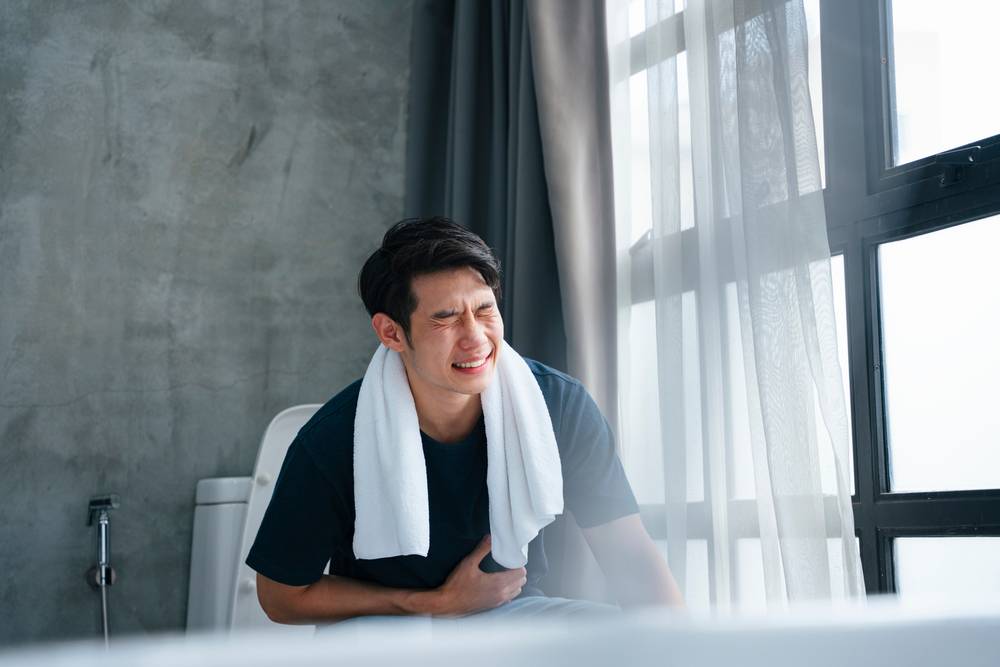Constipation is a condition where your bowel movements are infrequent and uncomfortable, with hard and dry stools.
Symptoms
Everyone’s bowel habits are different, but some common symptoms of Constipation include:
- passing fewer than three bowel movements a week
- hard or lumpy stools
- difficulty or pain in passing stool
- feeling that you have not completely emptied your bowels
- abdominal bloat/discomfort
Seek immediate medical attention if you experience these symptoms for an extended period of time (≥3 months) or if you develop any of the following more severe symptoms of concern:
- bleeding from the rectum
- blood in your stool
- persistent abdominal pain
- pain in the lower back
- a feeling that gas is trapped
- vomiting
- fever
- unexplained weight loss
Causes of Constipation
The colon’s role is to absorb water from food as it passes through, creating stool (waste). The colon’s muscles then propel the waste out through the rectum to be eliminated. When digested food moves along too slowly in the colon, your colon absorbs excess water from the stool, rendering it hard, dry and difficult to pass in what we term Constipation.
Common causes include:
- Poor diet
- Inadequate water intake
- Lack of dietary fibre – Fibre provides bulk to stools and softens them
- Lack of exercise
- Ignoring the urge to empty bowels
- Changes to routine or lifestyle e.g. during travel, or being under a lot of stress
- Pregnancy – women are more prone to constipation than men due to hormonal issues
- Old age
- Medications e.g. diuretics, Parkinson’s treatment, iron supplements, abuse of laxatives/enemas
- Other health conditions e.g.
- Pelvic floor disorder causing delayed emptying of the colon
- Gastrointestinal disorders e.g. irritable bowel syndrome
- Tumours or other obstructions such as colon polyps
- Abdominal hernia
- Metabolic diseases such as diabetes, hyperthyroidism
- Disorders of the Central Nervous System such as stroke, Multiple Sclerosis, Parkinson’s Disease
Complications
Excessive straining may cause
- Haemorrhoids, more commonly known as piles
- Anal fissures (tears in the skin around the anus) due to hard stool stretching the sphincter muscles.
- Rectal bleeding
- Rectal prolapse, where a small amount of intestinal lining pushes out from the anal opening
Treatment
- Taking laxatives as recommended by healthcare professionals
- Over-the-counter relief like fibre supplements (e.g. Fybogel), osmotic agents (e.g. Dulphalac), stimulants (e.g. sennosides), lubricants (e.g. liquid paraffin), enemas or suppositories (e.g. Dulcolax)
- Taking prescription medicines e.g.
- Lubiprostone, which increases fluid levels in the intestine
- Linaclotide or Plecanatide can help make bowel movements more regular for people with long-term constipation or IBS
- Prucalopride can help the colon move the stool along
- Switching out medications which may cause constipation, as recommended by your doctor
How Can Constipation Be Prevented?
Prevention is better than cure. The following are some ways to prevent constipation:
- Include 20 to 35 grams of fibre daily to help in the formation of soft, bulk stool (e.g. whole grains, beans, fresh fruits and vegetables)
- Increase fluid intake e.g. 8 glasses of water a day. Fluids can include juices and soup.
- Avoid consumption of alcohol or caffeinated beverages, which may cause dehydration
- Limit foods that are high in fat and sugar (such as sweets, cheese, and processed foods)
- Increasing the level of physical activity such as including exercise as part of the daily schedule
- Scheduling toilet time and positioning yourself to straighten the anorectal junction is also important
Conclusion
Constipation is easily treatable with over-the-counter medications or lifestyle changes. If you are still not getting any relief from that, it may be a good idea to visit your doctor to see if your gut symptoms are a result of some underlying condition.

